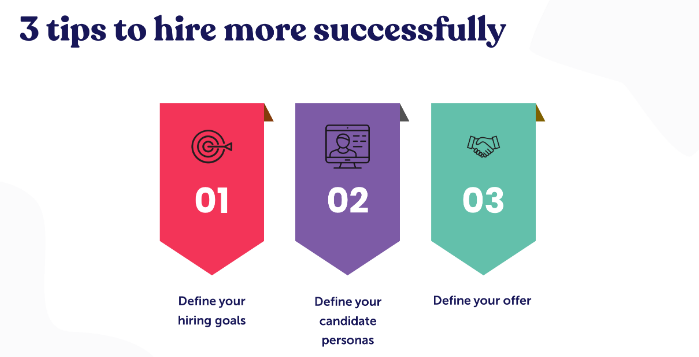Recruiting for Startups: 5 Reasons You Have Trouble Hiring Talent and How to Fix Them
Reading Time:
Reading Time:

In today's fiercely competitive job market, startups face an uphill battle in attracting and retaining top talent. Unlike established firms, startups often lack the brand recognition and resources to easily draw in skilled individuals. With persistent competition and resource constraints, startups must emphasize their potential for innovation and growth to persuade prospective employees of the value they offer. Effective document management plays a crucial role, ensuring streamlined processes that support organizational transparency and operational efficiency, which are vital for building trust and credibility with potential hires.
In this article, we will explore the five most common reasons why startups have trouble hiring and offer practical solutions to address each of these challenges. By understanding these issues and implementing the solutions provided, startups can level up their hiring game, ensuring their success in the long run.
If you are a CEO of a startup, chances are you’ve probably taken on multiple roles and responsibilities. And this is pretty common, especially in the early stages. However, taking on the role of an HR manager and handling the entire hiring process takes your precious time and focus away from critical tasks such as strategy development, managing key partnerships, or product development. Not to mention the stress, decreased productivity, and the feeling of being overwhelmed that comes with trying to do it all which can eventually reflect poorly on your company’s success.
That's why delegating hiring responsibilities is an important step for a CEO who wants to build a strong team while also focusing on their core responsibilities. Here’s how you can do it effectively:
When a startup is in its early stages and hasn't yet developed a strong employer brand, it falls on the CEO to pitch the company's vision and mission to each potential candidate. This can be a challenging task, as the CEO must not only communicate the company's goals and values but also convince the candidate that they will be a valued member of the team. That’s why establishing a company's employer brand is critical.
By establishing a strong brand, the company communicates its values, culture, and vision to candidates before they even apply for a position. This can help attract candidates who share the company's values and are excited about the prospect of joining the team. Additionally, a strong employer brand can help differentiate the company from its competitors and establish the startup as an attractive employer in the industry.
In addition to attracting new employees, a strong employer brand can help to retain current employees. When employees feel that they are part of a strong, positive culture, they are more likely to be satisfied with their job and stay with the company long-term.
There are many ways in which you can contribute to a well-developed employer brand, but we’re going to point out a few we believe are the most important, especially in the beginning:
Define your values: Start by defining the values that your company stands for. These values should be at the core of your employer brand and should be reflected in your company culture, messaging, and actions.
Develop an employee value proposition (EVP): An EVP is a statement that communicates what your company offers to employees in exchange for their skills and talents. This can include things like career development opportunities, a positive work environment, and competitive compensation and benefits.
Create a strong company culture: Your company culture is a key component of your employer brand. Focus on creating a positive, inclusive, and supportive environment where employees feel valued and motivated.
Leverage social media: Use social media to showcase your company culture, values, and EVP. Share photos and stories that highlight your team's accomplishments, events, and community involvement.
Offer competitive compensation and benefits: Offering competitive compensation and benefits packages can help to attract and retain top talent.
Another common issue that startups face when hiring and that makes finding the right talent difficult is not clearly defining their needs and goals. Without clear definitions of the type of candidate they're looking for, the role they want to fill, or the offers they can make, startups risk making poor hiring decisions or not attracting the right talent.
There are three factors you should consider in order to hire successfully.

One of the first steps you should take to ensure successful hiring is defining your startup’s goals. This includes determining how many positions you need to fill, what specific skills or experiences you are looking for, and what you hope to accomplish by hiring new employees. By clearly defining these goals, you can create a hiring plan that aligns with your business objectives.
Some questions you should consider when defining your hiring goals as a startup include:
Once you have defined their hiring goals, the next step is to define candidate personas. A candidate persona is a detailed description of the ideal candidate for the role, including their skills, experience, personality traits, and even their goals and motivations. By creating candidate personas, you can better understand the type of person you are looking for and tailor your hiring efforts accordingly.
Some questions you should consider when defining candidate personas include:
Finally, you need to determine what your company has to offer to attract and retain top talent. This includes looking beyond just salary and benefits and considering other factors that can make your company an attractive place to work. As a startup, you can offer unique opportunities for growth and development, a positive company culture, a flexible work environment, and other perks that appeal to the ideal candidate.
Thoroughly defining these elements creates a clearer hiring strategy that is more likely to attract the right candidates for your business.
In the early stages and especially in the very beginning, startups operate with limited resources and have a small team of employees. As the company grows and expands, it becomes necessary to hire more people to meet the increasing demand and workload.
If your startup is not prepared for this growth, it may struggle to find and hire the right people quickly, leading to delays in meeting business goals and objectives, missing out on potential profits and hindering its growth. This can also result in overburdening the existing employees, leading to burnout and turnover. And nobody wants that.
Luckily, there’s an easy way to avoid all of that – by building talent pools.
Talent pools are essentially a group of potential candidates who have already expressed interest in working for a company or have the required skills and experience needed for the company's future roles.
By building a talent pool, you can proactively identify and engage with potential candidates before you even have a specific job opening. This can save time and resources during the hiring process since you already have a group of qualified candidates to choose from.
Additionally, having a talent pool allows you to quickly fill any urgent hiring needs that may arise due to unforeseen circumstances. You can quickly identify and recruit top talent, reduce hiring costs and time-to-hire, and ultimately support the company's growth and success.
Ah, yes, if only you had more money, everything would be so much easier. This is actually the issue that most of the other problems can be rooted in, not just hiring. Well, the reality is that the resources are pretty limited, especially in the beginning, but it doesn’t mean there aren’t other ways you can make your hiring process much easier and more effective.
Maybe you can’t offer your candidates ultra-competitive salaries. But you can show them how working with you can benefit them in other ways and make them feel important and contributing. Providing other benefits like special perks, flexible work arrangements, stock options, health benefits, casual work environment, professional development, and education – all of that can provide a high-rewarding and beneficial experience for new employees without you having to stretch your budgets.
Secondly, we know how great it would be if you could just hire an HR team and let them run and worry about everything. And one day, not only will you be able to but you’ll have to. But until then, there are other ways you could compensate for not having a team.
For example, cross-training your employees to handle some of the hiring tasks as we already mentioned in the previous section will definitely make it easier for you and make them feel more engaged so it is a win-win right there. You also might want to consider outsourcing some of the HR or recruiting tasks if your budget allows you to.
While it may seem overwhelming to tackle all the hiring challenges at once, start by focusing on one area at a time. Make a plan by setting clear hiring goals and timelines, allocate your resources, and track your progress. It is important you take your time with the hiring process and do everything thoroughly. And we can help you with that.
You see, we were once a startup just like you, dealing with the same issues and frustrations, but aware that almost every startup faces these problems. We saw the struggle that every start-up founder and CEO had to go through to find the talent their company needs.
That is why we decided to create a tool that would offer everything a company on the rise might need to hire the best talent. A cost-effective solution that would help businesses manage the entire recruitment process from start to finish. And not only just to kickstart their growth but to maintain it long-term.
So, until you put together your HR dream team, IceHrm can help you make your recruitment process streamlined and efficient right from the get-go - build your employer brand from scratch, source and attract high-quality talent, create resourceful talent pools, and establish strong relationships with your potential candidates. In fact, it can help you do it all:
Kind of like having an HR team doing all the manual labor for you and leaving you with making the strategic decisions. After all, while a CEO's involvement in the hiring process is essential, their energy should be focused on company growth and decision-making, rather than dealing with administrative processes and tasks that can easily be automated.
Check out IceHrm's Recruitment module to understand how we can help you reduce hiring costs and attract top talent into your organization.